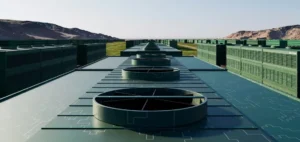Denmark inaugurates on Wednesday a carbon dioxide (CO2) storage site 1,800 meters under the North Sea, a tool considered essential to curb global warming. Led by the German chemical giant Ineos and the German energy company Wintershall Dea, the“Greensand” project should make it possible to store up to 8 million tons of CO2 per year by 2030, the equivalent of 1.5% of French emissions.
An ambitious project
The “Greensand” project is inaugurated this Wednesday in Esbjerg (southwest) by Crown Prince Frederik. Still in its infancy and very costly, carbon capture and storage (“CCS”) consists of capturing and then imprisoning CO2, the main cause of global warming. More than 200 projects are currently operational or under development worldwide.
Greensand is unique in that, unlike existing sites that sequester CO2 from nearby industrial facilities, it brings in carbon from far away. The gas is transported by sea to the Nini West platform on the edge of Norwegian waters and transferred to a reservoir 1.8 km below the surface.
Storage under the North Sea, a suitable solution
The North Sea is a suitable area for burial because it is home to many pipelines and geological reservoirs that have been empty after decades of oil and gas development. “Depleted oil and gas fields have many advantages because they are well documented and there is already infrastructure that can most likely be reused,” says Morten Jeppesen, director of the Center for Offshore Technologies at the Danish University of Technology (DTU).
CO2 storage potential in the North Sea
Near Greensand, TotalEnergies plans to trap 5 million tons of CO2 annually more than two kilometers below the seabed. For its part, neighboring Norway, a CCS pioneer, will receive tons of liquefied CO2 from the Old Continent in a few years. The country also has the largest CO2 storage potential in Western Europe. However, the quantities stored remain small compared to the emissions. The European Union emitted 3.7 billion tons of greenhouse gases in 2020.
CCS, a perfectible solution
CCS is considered necessary to limit CO2 in the atmosphere by both the Intergovernmental Panel on Climate Change (IPCC) and the International Energy Agency. However, this technology is not a miracle solution. The CO2 capture and storage process itself emits the equivalent of 21% of the captured gas, according to the Australian think tank IEEFA. Moreover, the technique is not without risks, the research center warns, citing the risk of leaks with catastrophic consequences.
In addition, CSS is expensive. The cost of carbon storage must be reduced to become a sustainable mitigation solution as the industry matures. CCS should not be used to maintain the current level of CO2 production, but it is necessary to limit greenhouse gas emissions. However, among environmentalists, the technology is not unanimously supported. Greenpeace Denmark believes that CCS does not solve the problem and prolongs structures that are harmful. They say that if Denmark really wants to reduce its emissions, it must address the sectors that produce a lot of them, namely agriculture and transport.






















